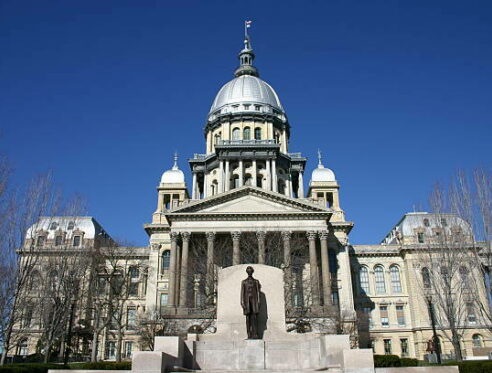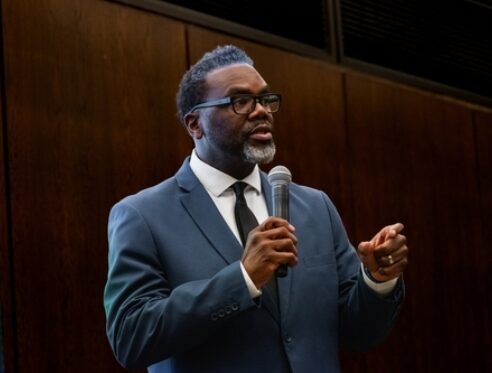Why it Matters: For the past decade, the district has relied on the enrollment-based funding approach as its primary method for funding schools.
Just this year, $1.37 billion in school funding was allocated through SBB.
Its abolition fulfills a commitment made by Mayor Brandon Johnson during his 2023 mayoral campaign to overhaul the district’s school funding system.
The announcement comes just days before the release of school budgets for the 2024-2025 school year.
Background: Before SBB, CPS’s school funding approach was a centralized, position-based system dubbed the “Quota Model.”
- Under this approach, school funding was allocated through “quota” formulas, with each school’s enrollment determining the number of teachers it received, based on a target student-to-teacher ratio.
Small amounts of non-personnel dollars were provided on top of teacher positions.
- The Quota Model was criticized for its lack of transparency, its complexity, its inflexibility, and the year-to-year volatility it created for schools.
For example, a single student at the enrollment quota threshold could determine whether a school gained or lost a teaching position.
- CPS debuted SBB in 2014 to mixed reviews from educators, parents, and community members.
Some school leaders welcomed the greater autonomy over their budgets that came with SBB, appreciating the ability to make funding decisions that were more aligned with their students' specific needs and priorities.
But others felt small schools were disproportionately hurt by the shift to SBB, especially with the district losing more than 75,000 students since 2013.
- Since 2022, the district has moved to gradually shift its budgeting model away from student-based funding.
This school year, SBB made up 40% of school-based budgets — down 6% from the previous year.
Get Smart Quick: Studies on Chicago’s SBB system have produced a range of results regarding its effectiveness.
Researchers at Roosevelt and Loyola Universities found that SBB contributed to racial inequality by concentrating the most resource-starved schools in Chicago’s Black neighborhoods.
However, the Federal Reserve Bank of Chicago found that SBB has led to greater equity across the school system, with more dollars flowing to elementary schools with low-income students and fewer dollars going to the most affluent schools.
Go Deeper: Instead of SBB, schools will now receive a predetermined number of staff members along with extra funding determined by need.
- Under the new formula, every school will get at least four foundation positions, including an assistant principal, plus “core and holistic teachers.”
The district will also provide every school money for professional development and after-school programs, as well as some discretionary money, although it is not clear how that will be calculated.
A school’s need will be determined by the little-known “Opportunity Index,” which considers a wide range of factors including race, income, student learning needs, the number of teachers a school was able to retain, student housing insecurity, community health metrics, and more.
- With budgets due to schools next week, it is still uncertain how funds will be distributed or what level of autonomy principals and Local School Councils (LSC) will retain over their school's budgets.
Principals were left to explain to anxious school communities how the district’s decision would affect next year’s school budget, but the lack of concrete details left school leaders with little information to assuage concerns.
Zoom Out: The end of SBB marks another significant shift under Mayor Johnson’s control of the city's public education system.
His board has already approved plans to remove police officers from schools, announced a move away from school choice, and promised a substantial increase in a community schools model that gives the Chicago Teachers Union (CTU) decision-making authority over both the schools and community organizations selected to receive $500,000 investments.
With Springfield acceding to Mayor Johnson’s desire to maintain mayoral control over the school board until January 2027, it is likely more change is on the horizon.
Reality Check: CPS is attempting to radically reconfigure how it funds schools while facing a $391 million budget shortfall.
- Considering its precarious financial situation, it remains unclear how CPS will manage to guarantee a significantly higher number of school-based positions, allocate additional resources to schools with greater needs, and still offer a meaningful amount of discretionary funding for principals and LSCs to manage.
The district's focus on standardizing positions across all schools may lead to a decrease in the level of control that principals and LSCs have over their individual school budgets.
- Given the ongoing and pervasive teacher shortage in Chicago, there's no assurance that positions allocated to schools will be filled.
The district consistently “saves” approximately $150 million each year by budgeting for school-based positions that remain unfilled or experience delays in the hiring process.
With the centralized funding of school-based positions, it remains to be seen what level of flexibility school principals and LSCs will possess when positions remain vacant for extended periods.
- The district's ability since 2021 to reduce its reliance on SBB while simultaneously increasing the amount of needs-based funding has been fueled by billions in COVID relief dollars.
After the district’s final $300M in COVID relief funding is expended next school year, CPS predicts its budget deficit will balloon to nearly $700M — and that’s before the anticipated increase in costs from a soon-to-be-negotiated CTU agreement this summer.
Our Take: Kids First Chicago has long championed a revamp of CPS's SBB system to better allocate school funds based on the nuanced needs of students and school communities – but only doing so after engaging with stakeholders on potential alternatives. The district claims its decision to end SBB was informed by stakeholder feedback at this year’s budget roundtables as well as through surveys and focus groups with school principals.
- But the district has shared no summaries from the budget roundtables or its principal engagement efforts, leaving stakeholders to take CPS at its word – even though Chicago principals have routinely advocated for more autonomy and flexibility over school budgets, particularly in times of resource constraint.
Given that eliminating SBB was a mayoral priority and Johnson had recently been planning for its dismantlement, CPS and its board should own their decision rather than attributing it to the influence of stakeholders.
- Shortly after his election, Mayor-elect Johnson stated that while he was now in a position to “impose [his] ideology” onto the public school system, he nevertheless felt that “democracy is the best form of governance.”
However, by vowing to “transition away” from non-neighborhood schools, initially promising to maintain and then subsequently revoking LSC members' authority to decide on the use of school resource officers, and abandoning SBB in favor of a centralized funding approach, Johnson’s administration is increasingly making decisions on behalf of school communities and not with them.
Regardless of one's stance on any of these decisions, with Mayor Johnson retaining mayoral control over the CPS board for the next two years, Kids First hopes that his administration will reverse its approach to making decisions unilaterally and begin to genuinely seek out and consider the input and viewpoints of parents, students, educators, and community members.
What’s Next: School budgets will be released the week of April 8th.
- Springfield will be watching for any funding changes to selective enrollment schools, with one legislator saying she believes the current board is changing the funding formula to provide less money to selective enrollment schools and to give more to neighborhood schools.
- Meanwhile, LSC elections are scheduled for the same week as the release of school budgets, taking place on April 10th for elementary schools and April 11th for high schools.
Newly elected and returning LSC members will discover the impact of the district's SBB decision on their schools in real-time, alongside Chicago families.



